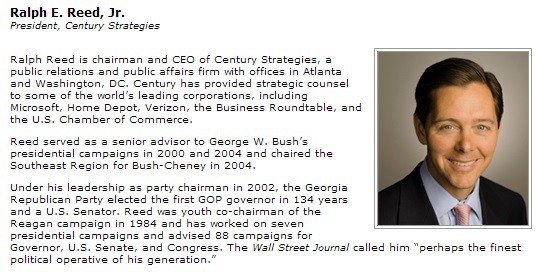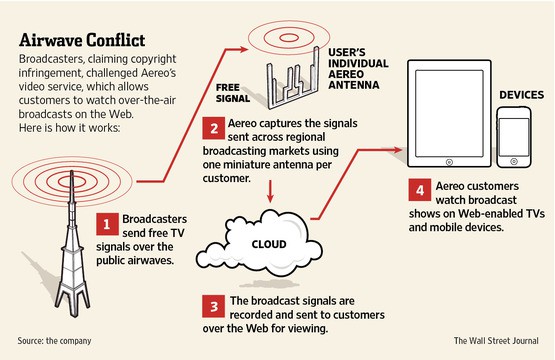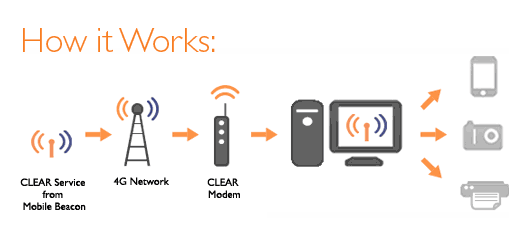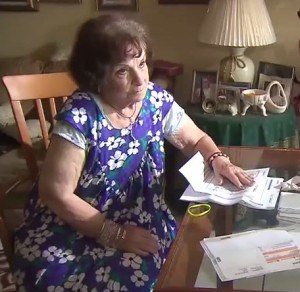
That “paragon of virtue” Ralph Reed is helping Comcast with their merger problems. (Image: Mark Fiore)
The owner of left-leaning MSNBC has engaged a religious conservative activist to handle consulting work on Capitol Hill for a cable company so hated, even ardent pro-business conservative Republicans are holding their noses contemplating a merger that would make Comcast even larger.
Ralph Reed has tried to keep his head down during his 8-10 year “association” with Comcast, whose executives make regular major contributions to Democratic Party candidates and play golf with President Barack Obama.
Reed’s ethically challenged past has made him notorious in Washington, and many well-connected lobbyists avoid publicly associating with the man who helped the disgraced lobbyist Ralph Abramoff rip off Native Americans for $100 million. Even worse, while Abramoff and Reed were working to rob various tribes blind in Mississippi, Alabama, and Louisiana, the next mission would be protecting off-shore sweatshops in the Northern Mariana Islands, a U.S. possession that lacks American labor law protections. Workers were paid less than half the American minimum wage, had their movements restricted, were sexually exploited, and churned out products for corporations that could still claim they were proudly “Made in the U.S.A.”
Both men kept it ‘klassy with a k’ with respect to their paying clients. Abramoff routinely called tribal leaders “monkeys” and Reed wanted to use his new found expertise in corporate lobbying to enrich himself. Reed sent e-mail to Abramoff recommending himself as a corporate lobbying asset, because of his ability to mobilize hundreds of thousands of religious conservative households through an extensive network of politically active pastors willing to use religion to advance the agendas of his corporate clients.
“I need to start humping in corporate accounts,” Reed wrote Abramoff, noting he could quickly create anti-gambling astroturf groups morally opposed to allowing new gambling ventures on religious grounds. In reality, his opposition was actually designed to protect Abramoff’s existing clients — Native American tribal casinos — from facing new competition.
 Reed is theoretically trying to promote the Comcast merger with skeptical political and religious conservatives who have heard loud complaints from constituents about the cable company. But one of Reed’s self-proclaimed selling points is that he prefers to move in the shadows.
Reed is theoretically trying to promote the Comcast merger with skeptical political and religious conservatives who have heard loud complaints from constituents about the cable company. But one of Reed’s self-proclaimed selling points is that he prefers to move in the shadows.
“I want to be invisible. I do guerrilla warfare,” Mr. Reed told a Virginia newspaper in 1991. “I paint my face and travel at night. You don’t know it’s over until you’re in a body bag.”
Had Reed kept a lower profile, his association with Comcast might have never seen the light of day.
“It’s widely known because Ralph’s been on conference calls,” one insider said. “It has been at least eight years; it’s been some time.”
Century Strategies, the Atlanta-based firm Reed owns, has been on retainer with Comcast for eight or 10 years, the source said.

Unfortunately for Comcast, Reed has appeared at one too many microphones lately, spouting off at various conservative functions including the annual Faith & Freedom Coalition, where he loudly compared the Supreme Court’s decision in favor of same-sex marriage as a historical mistake as explosive as the 1857 Dred Scott decision. That was the one where the court ruled that all blacks — slaves as well as free — were not and could never become citizens of the United States. How could I have missed the similarities!
Comcast didn’t respond to a request for comment about its reported engagement of Reed’s company. Century Strategies also didn’t respond to a request for comment from the Washington Blade, which exposed the Reed-Comcast link, to confirm the reports.
Much of what constitutes official paid lobbying vs. an informal conversation is just part of the murky world of Beltway lobbying. So far, Reed has not filed as an official lobbyist.


 Subscribe
Subscribe

 While regulators sort through the thicket of fine print that keeps hundreds of thousands of families from qualifying for Comcast’s $9.95 Internet Essentials affordable Internet program, a much simpler offer has emerged that doesn’t work overtime to protect Comcast’s broadband revenue from being cannibalized. In short, regulators don’t need to cut deals to expand programs like Internet Essentials in return for saddling residents with America’s “worst cable company.” There are alternatives.
While regulators sort through the thicket of fine print that keeps hundreds of thousands of families from qualifying for Comcast’s $9.95 Internet Essentials affordable Internet program, a much simpler offer has emerged that doesn’t work overtime to protect Comcast’s broadband revenue from being cannibalized. In short, regulators don’t need to cut deals to expand programs like Internet Essentials in return for saddling residents with America’s “worst cable company.” There are alternatives.

